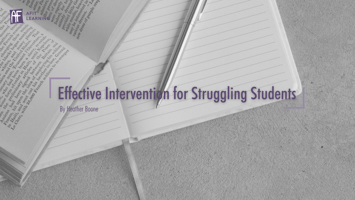Intervention is an increasingly common term in the world of education. To intervene as an educator,...
When a Little Frustration Means a Lot
When I was a child, I devoured books. I was a self-proclaimed bookworm who prided myself on
my speed-reading ability and I read anything and everything I could get from my school library.
Growing up in a rural Canadian town, my highlight of the school year was the annual book fair.
Held in the fall of the year, the books would arrive like a carnival and, for me and most of my
friends, it brought all of the accompanying excitement. This was before the time of the internet,
and before the world was bombarded with advertisements. So, the book fair became a special
time for readers, as it allowed a glimpse into the ever-changing world of storytelling. Readers
like me were giddy with excitement as we anticipated what awaited behind the closed library
doors. What stories and reading amusements awaited us? What high-flying adventures and
topsy-turvy escapades would be found within the pages? I could never understand the
students who walked through the library with apathy and who chose to purchase posters and
erasers over books. How could they not see the printed marvels before them? How could they
not get swept up in the enchantment of the book fair?
Eventually, my love of books led me into the field of education and I finally nestled into
teaching high school English Language Arts and started a family. Throughout my years of
university, my love of reading never wavered. So, when I found out that I was expecting my first
child, I was ecstatic and determined that he would be exposed to reading immediately. When
my son was born, he was perfect. From the time he was born, we read every single day. Why?
Because reading was so important to me and I had wanted him to have the optimum start to
his reading development. My house became its own book fair and with a multitude of choices.
I spent more money on books than toys. Of course, I knew I had to start his reading
development early. I felt strongly that it was the only way I could secure a future of Tolkien,
Dahl and Montgomery in my household. Yes, I was that mom.

With all of the reading that transpired in his first five years, I felt my son was completely
prepared for his first day of kindergarten. I had armed my son with everything and my little
soldier was prepared to start school. His handsome button-up shirt and denim pants were a far
cry from the combat uniform I envisioned. We were ready for numbers and problem-solving.
We were ready for friendships and motor skill activities. We were ready for learning. And most
of all, we were ready for reading.
Or so I thought.
Mom's Spidey Sense
In the Marvel universe, Spider-Man has this spider-sense that warns him when things are about
to go wrong. By Grade One, my mom-sense was tingling. There was a real sense that something
was not right with my son’s reading. He started to really dislike classroom activities involving
sight words and spelling. He became less interested in new books at home and began to only
want to read the old ones. There were phone calls from the teacher describing his avoidant and
distractible behaviours in the classroom. I tried to dismiss the concerns that were emerging and
I would try to justify them in any way. But I was missing the signs. This was academic
frustration. Avoidance. Distraction. Disinterest. Negative Attitude.
As he moved into Grade Two, my mom-sense was tingling more than ever and I started to take
on the role of Nancy Drew. Paying close attention to his reading, I noticed he was struggling to
sound out words and read them accurately. It became apparent that he was memorizing words
on the page rather than actually reading the individual words. At home, the more we moved
away from the enjoyment of hearing the stories and the more he had to read the words
himself, the more frustrated he became. The fewer stories he wanted to read. At school, the
avoidance, distraction, and disinterest continued. Of course, my gender stereotyping excused
his actions. After all, aren’t boys active, energetic and occasionally getting themselves in
trouble?
Then in Grade Three, the arrival of the annual Book Fair at my son’s school transported me back
three decades. I remember the excitement of walking into the library with my son and admiring
the books that were shining with nostalgia on the tables, so eloquently organized and stacked.
There were hundreds of books ready to enchant a new audience of readers. I was once again
giddy with excitement and anticipation. What wondrous paperbacks and picture books would
soon populate my bookshelves? With genres fighting for my attention and book covers catching
my eyes, I was eager to purchase whatever books my son desired that glorious fall day. I
presented him with option after option as we wandered from table to table. Yet he had no
interest in any book on display. As his attention waned, my own inner child was slowly
deflating. There was only apathy written on his face.
He wanted a poster.
Nothing to Assess, or the Wrong Assessment?
Following my disillusionment at the book fair, and sometime during that school year, I
requested that the school complete an assessment on my son to explore his learning. When
you finally open that door, the door to wanting to find out more about what is happening, it
comes with some level of apprehension. What if I’ve been overreacting? What if I’ve been
putting too much pressure on my child? What if they don’t find anything wrong? What if….
When the first assessment completed at the school level showed exactly that – nothing. I was
disheartened. My first steps towards an answer left me with a closed door. The results of the
assessment revealed average results and indicated that my son was fairly typical for his age.
But he wasn’t. I knew he wasn’t.
So, I focused on the fact that this assessment didn’t measure my son’s frustration. It didn’t
measure my extraordinary efforts to develop his reading. It didn’t measure my frustration. And
this frustration couldn’t be ignored. My mom-sense was still tingling. So, I didn’t stop there. I
kept going.
Finally a Diagnosis!
Unfortunately, things don’t happen immediately. Weeks passed with little knowledge gained.
My son was continuing to struggle in school. His frustration was increasing. At home, he didn’t
want to do homework and complained copiously. His mornings were full of negative comments
and questions. "Mom, why do I have to go to school? I don’t want to go to school. Can’t we stay
home today? School is soooo hard".
Eventually, my persistence led me to find the expertise and specialized testing that I hoped
would have the answers to all of the challenges my son was experiencing. Why was he so
frustrated? Why was he so negative towards school? Why, despite all my efforts, was reading
so hard for him? I remember when the results of a specialized assessment were finally provided
to me. There were so many mixed emotions. There was relief that finally there was an answer
and my concerns had been validated all this time. However, there was also some level of
solemnity in knowing that school would be always be challenging for my son.
His diagnoses: Dyslexia. Dysgraphia. Dyscalculia.
But with the diagnoses, there was a direction and a way to move forward.
Accommodations to remove the barriers.
Strategies to reduce the frustrations.
Although it took time to rebuild his confidence at school, things gradually improved and my son
eventually found himself immersed back into the carnival of reading. At home, books were
once again highlighting our evening and a new parade of characters and adventures were
captivating my son. With the frustration removed, he could return to the joy of learning and the
joy of storytelling that he had pushed away for several years when his frustration had been
building.

Frustration Matters
Today, my son still has struggles related to his diagnoses. School will never be easy for him. But
we’ve learned a lot along the way, and we will continue to learn more. My experience has made
me very aware of the importance academic frustration plays at school. Although not every child
has a diagnosis, many children experience academic struggles and can communicate their
academic frustration in a variety of ways. And we need to listen and read that frustration. As
parents and educators, it’s something we must become more attuned to in order to ensure that
we are supporting every child.
Frustration matters. It’s an early warning sign of underlying problems that need to be properly
assessed and addressed. At AFIT Learning, we provide educators with the ability to measure a
student’s frustration and relate it to their academic development. AFIT also empowers teachers
with recommendations that allow them to more effectively accommodate the specific learning
needs of each child. We invite you to become part of our AFIT Learning community and
continue to learn more about the pivotal role frustration plays in the classroom.




